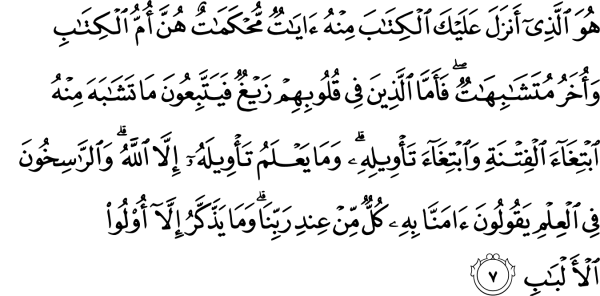Muhkamat and Mutasabihat Verses in Quran
The Qur’an comprises of both two types of verses .
- Muhkamat Verses محکم : Clear verses called as Muhkamat Verses e.g a book the verses of which are Muhkam…” [Surah Hud, verse 1].
- Mutasabihat Verses متشابه : Some verses are Allegorical (Mutashabihat) e.g. “‘The hand of Allah is above their hands. “[Surah Fatah, verse 10]
Also read : Free Quran as a gift
What is the difference between muhkam and Mutashabih?
The entire Qur’an is Muhkam (clear and comprehensible) in a sense that all its verses are the truth and every word and purport is so accurate that none can raise any objection. The words and purport are all clear, coherent and resolute.Where the entire Qur’an is said to be Allegorical (Mutashabih), it means that all the verses are similar and alike in their beauty, eloquence and truth.

(3:7) It is He Who has revealed the Book to you. Some of its verses are absolutely clear and lucid, and these are the core of the Book.5 Others are ambiguous.6 Those in whose hearts there is perversity, always go about the part which is ambiguous, seeking mischief and seeking to arrive at its meaning arbitrarily, although none knows their true meaning except Allah. On the contrary, those firmly rooted in knowledge say: ‘We believe in it; it is all from our Lord alone.’
In the above verse of Surah Al Imran, “Muhkamat” refers to those verses whose meaning is apparent and clearly comprehensible. They are the ‘Ummul Kitab” (“Mother of the Book”) in the sense that they constitute the substance and basic principles of the Qur’an. They contain clear orders and prohibitions wherein lies no cause of doubt for anyone. Those verses that are seemingly obscure and ambiguous will also be included in this type of verse. Only those verses whose interpretation is known exclusively by Allah are referred to as the Allegorical Verses (Mutashabihat).
THE ATTITUDE OF THOSE WHO ARE SOUND IN KNOWLEDGE
“No one derives true admonition from anything except the men of understanding. (3:8) They pray to Allah: ‘Our Lord! Do not let our hearts swerve towards crookedness after You have guided us to the right way, and. bestow upon us Your mercy. Surely You, only You, are the Munificent Giver! (3:9) Our Lord! You surely will gather mankind together one Day, a Day about (the coming of which) there is no doubt. Surely Allah never goes against His promise.’
People who have sound knowledge interpret the Allegorical Verses (Mutashabihat) as they understand the clear and comprehensible verses (Muhkamat). They reject whatever interpretations seem to contradict and conflict with the principle (Muhkam) verses. They interpret in a way that does not contradict the accepted views and principles. If they cannot do this, they accept it to mean what Allah had willed it to mean. This method of approach is the best and the most cautious.
Many people try to uncover the meanings of these verses but because of the corruption in their hearts, they cannot understand them. They also attempt to unravel the hidden meanings of the Allegorical verse (Mntashabiliat), eventually causing dissension by concocting interpretations that conform to their personal dictates, whims and fancies, even though these contradict the accepted principles of the Qur’an. Many people who reject the Ahadith soon reject the Qur’an as well because they seek to pursue the meanings of the Allegorical verse (Mntashabiliat) and because the inherent evil in their hearts drives them away from the Qur’an.
EXAMPLES OF SUCH ALLEGORICAL VERSE (MUTASHABIH VERSES) ARE:
- “The Most Merciful is firm upon the throne.” [Surah Taha, verse 5]
- “The day when the calf shall he exposed. “[Surah Qalam, verse 42]
- “Your Lord come and the angels in rows. “[Surah Fajr, verse 22]
- “‘The hand of Allah is above their hands. “[Surah Fatah, verse 10]
Those who are sound and firm in their knowledge accept all these without needing to understand their exact meanings and say that they, take the meaning in whichever way Allah desires it to be understood. “Those who are sound in knowledge say, We believe therein, all is from our Lord.
“These are men who are well versed in the Qur’an and admit their ignorance concerning the Allegorical verse (Mntashabiliat), which is beyond their knowledge. When Imam Malik RA was questioned regarding the meaning of the verse, “The Most Merciful is firm upon the throne,” he replied, “The literal meaning
is understood but the manner is unknown. Belief in it is incumbent and to question it is an innovation/’ It is incumbent to believe that Allah is free from faults, deficiencies and from the need for a body. At the same time, it is also necessary to believe in everything revealed in the Qur’an.
In this way, one does not conflict with the belief that “Nothing is like Him” [Surah Shura, verse 11]. Many people take the literal meaning of such verses and forget the accepted principle of “Nothing is like Him.” Sayyidah Ayshah RA narrates that the Holy Prophet Sallalhu alaihe wassalam said, “When you see people who attempt to interpret the Allegorical verse (Mntashabiliat) then avoid them, for they are the ones that Allah has mentioned.” (i.e. warned against in the verse: “As for those who have crookedness in their hearts, they pursue those that are allegorical (Mutashabihat), thereby seeking to cause dissension and seeking their interpretation.”)
Some commentators maintain that the Allegorical (Mutashabihat) are actually a test for the knowledgeable people with an inquiring mind that they desist from probing into the matter. As for those who have no inclination towards learning, it serves to inspire them to acquire the knowledge of the Clear
and Comprehensible verse (Muhkamat)
Discover more from Islam Hashtag
Subscribe to get the latest posts sent to your email.






Very informative.Thanks.
Is there any eBook of Quran mutashabehat aayat compiled